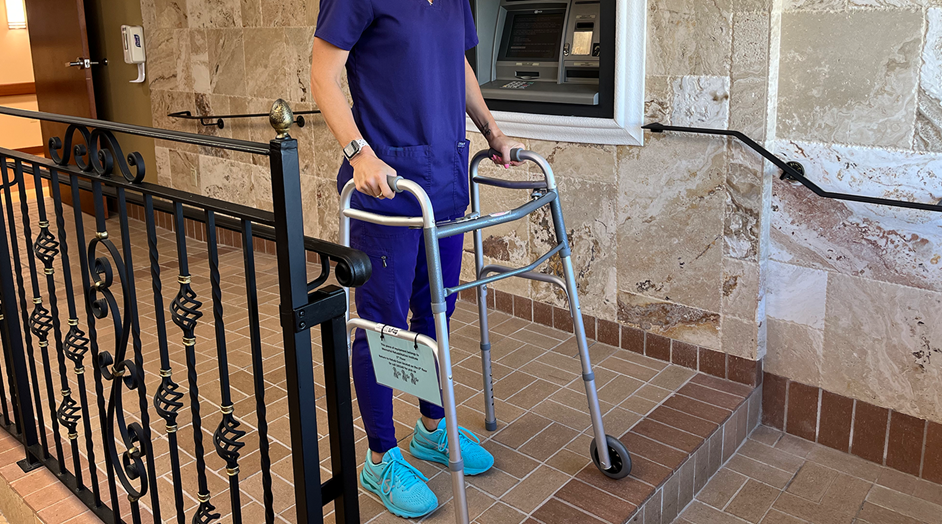How Pharmacists Can Help Prevent Falls in Older Adults
October 20, 2025

Falls are one of the most common causes of injury and hospitalization for older adults. As we get older, changes in balance, vision, muscle strength, and reaction time can make us more likely to fall. Many focus only on hazards like loose rugs or poor lighting, but your medications can also play a big role.
That’s where your pharmacist comes in. By reviewing your prescriptions and over‑the‑counter medicines, we can spot medications that might increase your risk of falling and help you stay steady on your feet.
How Medicines Can Affect Your Balance
Some medicines—or combinations of medicines—can cause dizziness, drowsiness, confusion, or drops in blood pressure. These effects make falls more likely.
Medications to be aware of include:
- Anxiety medicines
- Antidepressants
- Antipsychotics
- Blood pressure medicines
- Diuretics (water pills)
- Sleep aids
- Opioid pain medicines
What Can Pharmacist Do to Help Prevent Falls?
Pharmacist can help reduce your risk of falling by:
- Review all your medicines to see which might cause balance problems
- Suggest safer alternatives or lower doses to your doctor if needed
- Explain possible side effects so you know what to watch for
- Work with your healthcare team to adjust medicines when necessary
Hidden Risks of Vitamins, Herbals, and Over-the-Counter Products
- Antihistamines like diphenhydramine (Benadryl) or chlorpheniramine: Found in many allergy and nighttime products, these can cause drowsiness, blurred vision, and confusion.
- Cough and cold products: Some contain sedating antihistamines or decongestants that can make you feel dizzy, jittery, or raise your blood pressure.
- Heartburn or nausea remedies: Certain ones can cause electrolyte changes, leading to muscle weakness or confusion.
- Pain relievers: High doses of NSAIDs like ibuprofen or naproxen can raise blood pressure or cause dizziness in some people.
- Gingko biloba: Sometimes used for memory, but it can cause dizziness and increase bleeding risk, especially if you’re on blood thinners.
- Kava: Used to help people relax, but it can make you sleepy and slow your coordination.
- Valerian root: Often taken for sleep, but it can cause drowsiness or slow your reaction time.
- St. John’s Wort: Can be used for mood, but it may interact with many medicines, and cause side effects like dizziness.
- Vitamin D: Excellent for strong bones, but too much can raise calcium levels in your blood. This can make you feel weak, confused, or even affect your heart rhythm.
- Vitamin A: Your body needs some, but large doses can cause dizziness, upset stomach, or headaches.
- Iron: Important if your doctor prescribed it because you don’t have enough. But it may sometimes make you feel dizzy or lower your blood pressure.
What You Can Do at Home to Prevent Falls
Here are some steps you and your loved ones can take:

- Keep an up‑to‑date list of all your medicines and bring it to every pharmacy or doctor visit.
- Tell your pharmacist or doctor right away if you notice dizziness, drowsiness, or unsteadiness.
- Use a pill organizer or set reminders so you don’t miss doses or take extra by accident.
- Ask your pharmacist about fall‑risk screening tools like the CDC’s STEADI‑Rx.
- Make your home safer by adding grab bars, improving lighting, and removing trip hazards.
The Bottom Line
Your pharmacist is one of the easiest healthcare professionals to reach, and they can help make sure your medicines are safe for you. Preventing falls is about more than just avoiding slippery floors—it’s about making sure your medicines are working for you, not against you.
Most importantly, it’s not just what medications or vitamins you take, but how you take them. Regular check-ins with your pharmacist can lower your risk of falls, support your independence, and help you feel more confident throughout your day.
Learn more about Memorial's Pharmacy Services.
Get more tips on how to prevent falls by visiting Memorial Healthcare System's Injury Prevention page.




Fall Prevention Checklist to Safeguard Your Health
Check out this fall prevention blog for practical tips to assess your home to determine what changes you need to make to create a safer environment.
